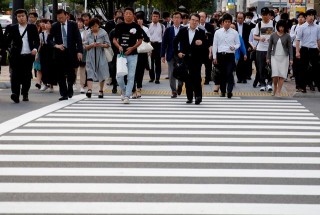Loading
Search
▼ Japan Raises Economic Growth Forecast For Next Fiscal Year
- Category:Other
TOKYO – Japan’s government raised its economic growth forecast for the next fiscal year, helped by an expected boost from a $122 billion fiscal package that would help cushion the hit from weaker global demand.
he economy is now expected to expand 1.4% in price-adjusted real terms in the fiscal year starting April 2020, according to the Cabinet Office’s projections, approved by the Cabinet on Wednesday.
That marked an upgrade from the government’s previous forecast of 1.2% growth issued in July. The government kept its estimated 0.9% growth for the current fiscal year ending in March 2020.
The upgrade largely stemmed from an improvement in domestic demand due to stronger corporate investment and a boost to growth from public spending from the fiscal package approved by the Cabinet this month.
The government expects capital spending to grow a robust 2.7% next fiscal year, compared to 1.9% in the previous assessment in July. Public demand was seen adding 0.5 percentage point to GDP growth in fiscal 2020, up from 0.2 percentage point seen previously.
The boost from the fiscal package is expected to more than offset weakness in external demand as slowing global growth threatens to leave a deeper mark on the economy.
The government expects a 0.1 percentage point drag from external demand next fiscal year, compared to a positive 0.2 percentage point contribution seen previously.
The downgrade largely stems from a weaker rebound in exports, which the government sees expanding at a pace of 2.4% next fiscal year, down from 4.3% seen previously.
The government’s projections come as the Bank of Japan is expected to keep monetary policy on hold on Thursday as the fiscal package and progress in U.S.-China trade talks take some immediate pressure off the central bank to support growth.
The Cabinet Office projected overall consumer inflation, which includes volatile fresh food and energy costs, at 0.6% for this fiscal year and 0.8% for the following year – remaining far from the BOJ’s elusive 2% price target.
Japan’s economy expanded at an annualized 1.8% in the third quarter because of stronger consumer and business spending, but analysts expect a contraction in the current quarter due to the increasing external and internal pressures.
Weighing on the outlook are a slowdown in China’s economy and a nationwide sales tax hike in October, which appears to have hit private consumption harder than policymakers initially thought.
The Cabinet Office said private consumption will grow just 0.6% in fiscal 2019, down from 0.9% seen in the previous assessment in July, due to a decline in consumer sentiment and lower summer bonuses.
For fiscal 2019 and fiscal 2020, the Cabinet Office forecast nominal economic growth of 1.8% and 2.1, respectively. Higher nominal growth estimates point to government expectations for greater tax revenue
he economy is now expected to expand 1.4% in price-adjusted real terms in the fiscal year starting April 2020, according to the Cabinet Office’s projections, approved by the Cabinet on Wednesday.
That marked an upgrade from the government’s previous forecast of 1.2% growth issued in July. The government kept its estimated 0.9% growth for the current fiscal year ending in March 2020.
The upgrade largely stemmed from an improvement in domestic demand due to stronger corporate investment and a boost to growth from public spending from the fiscal package approved by the Cabinet this month.
The government expects capital spending to grow a robust 2.7% next fiscal year, compared to 1.9% in the previous assessment in July. Public demand was seen adding 0.5 percentage point to GDP growth in fiscal 2020, up from 0.2 percentage point seen previously.
The boost from the fiscal package is expected to more than offset weakness in external demand as slowing global growth threatens to leave a deeper mark on the economy.
The government expects a 0.1 percentage point drag from external demand next fiscal year, compared to a positive 0.2 percentage point contribution seen previously.
The downgrade largely stems from a weaker rebound in exports, which the government sees expanding at a pace of 2.4% next fiscal year, down from 4.3% seen previously.
The government’s projections come as the Bank of Japan is expected to keep monetary policy on hold on Thursday as the fiscal package and progress in U.S.-China trade talks take some immediate pressure off the central bank to support growth.
The Cabinet Office projected overall consumer inflation, which includes volatile fresh food and energy costs, at 0.6% for this fiscal year and 0.8% for the following year – remaining far from the BOJ’s elusive 2% price target.
Japan’s economy expanded at an annualized 1.8% in the third quarter because of stronger consumer and business spending, but analysts expect a contraction in the current quarter due to the increasing external and internal pressures.
Weighing on the outlook are a slowdown in China’s economy and a nationwide sales tax hike in October, which appears to have hit private consumption harder than policymakers initially thought.
The Cabinet Office said private consumption will grow just 0.6% in fiscal 2019, down from 0.9% seen in the previous assessment in July, due to a decline in consumer sentiment and lower summer bonuses.
For fiscal 2019 and fiscal 2020, the Cabinet Office forecast nominal economic growth of 1.8% and 2.1, respectively. Higher nominal growth estimates point to government expectations for greater tax revenue
- December 19, 2019
- Comment (0)
- Trackback(0)


